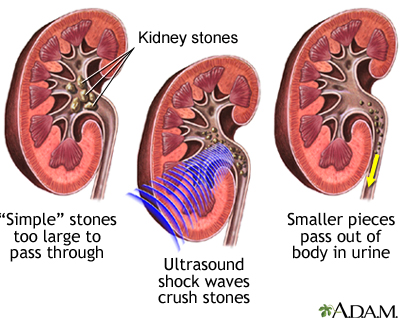Kidney Stones vs UTI: Just How to Identify and Treat Each Condition Effectively
Kidney Stones vs UTI: Just How to Identify and Treat Each Condition Effectively
Blog Article
Discovering the Effects and Causes of Kidney Stones in Contrast to Urinary System Infections: A Detailed Guide
The exploration of kidney rocks and urinary system infections (UTIs) reveals a complicated interaction of signs and symptoms and underlying reasons that require careful assessment. While both problems can lead to hematuria, they offer distinct professional attributes and develop from different etiological variables. Comprehending the subtleties of each problem is vital for efficient diagnosis and management. What are the vital differences in their signs and symptoms, and how might these notify treatment strategies? The answers to these inquiries may supply vital insights into the avoidance and care of these common urological problems.
Overview of Kidney Stones
Kidney stones, additionally referred to as renal calculi, type when specific materials in the pee crystallize and accumulation, leading to the development of difficult down payments within the kidneys. These stones can differ in dimension, varying from a grain of sand to a golf round, and can be made up of numerous products, the most common being calcium oxalate, uric acid, struvite, and cystine. The formation of kidney rocks is influenced by a number of aspects, consisting of nutritional habits, fluid intake, and hereditary proneness.
Signs of kidney rocks might consist of extreme discomfort in the back or side, blood in the urine, nausea or vomiting, and frequent peeing, particularly as the rock relocates with the urinary tract. Diagnosis normally includes imaging research studies such as ultrasound or CT scans, together with urinalysis to determine the stone's structure.
Treatment options vary based upon the size and sort of rock, along with the severity of symptoms (Kidney Stones vs UTI). Little rocks might pass normally with raised liquid consumption, while larger rocks might need medical interventions such as lithotripsy or medical elimination. Comprehending the pathophysiology and danger elements related to kidney rocks is important for reliable prevention and administration
Overview of Urinary System System Infections
Urinary tract infections (UTIs) are usual microbial infections that influence any type of component of the urinary system, including the kidneys, ureters, bladder, and urethra. They mainly occur when germs, usually from the gastrointestinal tract, get in the urinary system, leading to inflammation and infection. UTIs are categorized right into two primary types: straightforward and challenging. Straightforward UTIs usually occur in healthy and balanced individuals with regular urinary system tracts, while difficult UTIs may emerge in individuals with hidden conditions, such as architectural irregularities or endangered immune systems.
The frequency of UTIs is significantly greater in women than males, mainly because of anatomical differences, such as a much shorter urethra. Risk aspects include sex, specific contraceptive methods, urinary retention, and dehydration. The medical diagnosis of UTIs is normally verified via pee examinations, which may expose the visibility of bacteria, white blood cells, or red cell.

Signs of Kidney Stones
The discomfort linked with kidney stones can show up in different means, typically leading individuals to look for medical attention. One of the most typical signs is serious discomfort, normally local in the reduced back or side, which may radiate to the abdominal area or groin. This discomfort, commonly described as sharp or cramping, can take place suddenly and may vary in strength.
Furthermore, individuals might experience hematuria, or blood in the urine, which can range from microscopic total up to visible discoloration. This symptom may be come with by changes in urinary routines, such as raised frequency or seriousness, in addition to pain during urination. Nausea or vomiting and throwing up are also common, commonly arising from the body's response to intense pain.
In many cases, individuals may experience high temperature and cools, especially if a secondary infection develops due to the obstruction brought on by the stones. Generally, the mix of serious pain, hematuria, transformed urinary patterns, and gastrointestinal signs can give substantial understanding into the existence of kidney stones, requiring timely medical content examination and intervention. Comprehending these symptoms is important for prompt medical diagnosis and reliable management of the condition.
Symptoms of Urinary System System Infections
Infections within the urinary tract usually offer a series of unique symptoms that can dramatically influence every day life. The most common symptoms consist of a persistent urge to urinate, frequently accompanied by a burning experience throughout urination, referred to as dysuria. People may additionally experience increased frequency of urination, creating percentages of pee each time.
Other significant signs include smelly or gloomy urine, which might show the presence of germs or pus. In many cases, pee may show up red or pink because of the existence of blood, a condition called hematuria. In addition, individuals may experience pelvic pain or pressure, which can further worsen the feeling of seriousness.
Systemic symptoms may additionally materialize, such as high temperature, chills, and exhaustion, particularly if the infection has risen to the kidneys. It is crucial to acknowledge these signs and symptoms Click This Link early, as neglected urinary system system infections can cause more serious difficulties. Kidney Stones vs UTI. Prompt clinical focus is advised when these signs are observed, allowing for appropriate diagnostic examination and therapy to minimize pain and prevent additional wellness concerns
Reasons For Each Condition
Often, kidney stones and urinary system tract infections develop from distinct yet in some cases overlapping reasons that can affect people differently. Kidney stones generally develop because of metabolic elements, dietary options, and hereditary proneness. Raised degrees of calcium, oxalate, or uric acid in the urine can result in stone development. Dehydration, not enough liquid intake, and high-sodium diet plans can aggravate these problems, advertising crystallization within the urinary system system.

Recognizing these unique causes is important for prevention and therapy. Kidney Stones vs UTI. While way of life adjustments may alleviate the danger of kidney stones, proper hygiene and prompt therapy of urinary system infections are crucial for decreasing their recurrence and linked issues
Conclusion
In summary, kidney stones and urinary tract infections existing unique signs and underlying reasons. Kidney stones are defined by extreme pain and metabolic aspects, while urinary system tract infections mostly involve bacterial infections leading to urinary system seriousness and discomfort.
The exploration of kidney rocks and urinary tract infections (UTIs) reveals a complicated interaction of symptoms and underlying causes that call for careful evaluation.Urinary system tract infections (UTIs) are usual bacterial infections that impact any type of component of the urinary system, consisting of the kidneys, ureters, bladder, and urethra.Often, kidney stones and urinary system system infections arise from distinct yet sometimes overlapping causes that can impact individuals in different ways.In recap, kidney rocks and urinary system infections present distinct symptoms and underlying causes. Kidney stones are defined by extreme discomfort and metabolic elements, while urinary tract infections mainly include bacterial infections leading to urinary necessity and discomfort.
Report this page